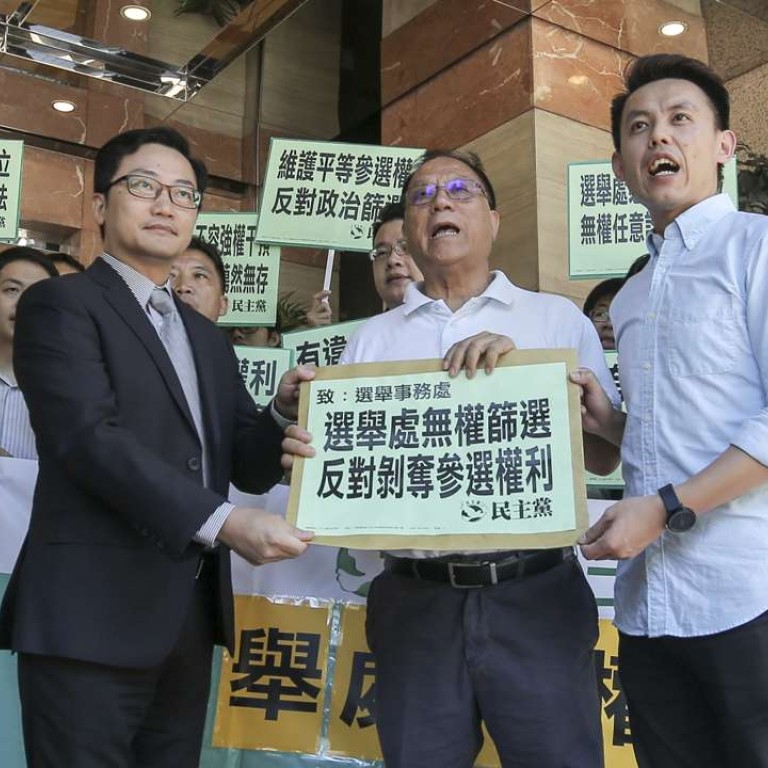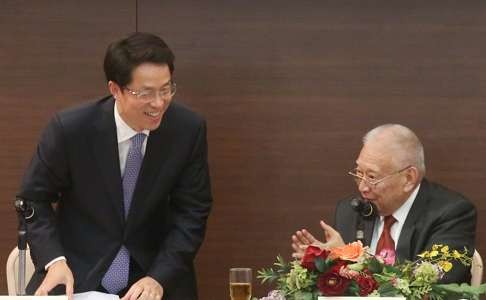
Poll puzzler: will a new election rule aimed at containing Hong Kong localists backfire?
A form requiring Legco candidates to recognise the city as an inalienable part of China or risk disqualification has sown confusion and led to accusations of unfair treatment
Barely 48 hours before the two-week nomination period for the Legislative Council elections began on July 16, the Electoral Affairs Commission unveiled a surprise.
It required all potential candidates to jump through an additional hoop of signing an extra form declaring Hong Kong an inalienable part of China – or risk disqualification.
But as events unfolded over the next two weeks, the new rule has proven to be a stumbling block rather than a neat solution to containing the growing momentum of calls for Hong Kong independence. Along the way, one immediate casualty hamstrung by the hoop is the government’s reputation.
A person close to the government insisted the introduction of the form, on top of making the standard declaration to uphold the Basic Law, was not even discussed at meetings of the Executive Council as the move did not involve any new government policy and legislation. Exco, the city’s main policymaking body, has been on a four-week break since July 12.
A mainland Chinese official handling Hong Kong affairs told the Post that disallowing those who advocated Hong Kong independence from running in the elections was “a principle which can’t be compromised”.
Beijing’s uncompromising stance was underlined by the warning by its top representative in Hong Kong, Zhang Xiaoming, against allowing the Legco elections to be used as a platform to promote independence. The director of the central government’s liaison office said last week that the need to stop pro-independence activists from being elected into the legislature was an issue not only of the law, but a matter of “right and wrong”.

Professor Lau Siu-kai, vice-chairman of the Chinese Association of Hong Kong and Macau Studies, said the additional form served the political purpose of showing that the Hong Kong government attached great importance to safeguarding national sovereignty. The association is the central government’s top think tank on Hong Kong affairs.
“However, I think the development in the past two weeks proves that it would have been better had the new requirement for aspirants to sign a confirmation form not been implemented,” Lau, who once headed the Central Policy Unit, the Hong Kong government’s think tank, said.
He said Hong Kong officials had failed to explain clearly the rationale for the new rule and election officials had showed blatant inconsistencies in processing the papers of different aspirants.
Many pan-democrats, who have been taking part in local politics within the framework of the Basic Law, boycotted the new form as “political screening”. Yet their candidacies have been validated by the commission since early this week, triggering confusion, accusations of unfair treatment and genuine fear that non-compliance by others could still lead to disqualification.

Several localist candidates from Civic Passion, who support the cause on a personal level, signed the confirmation form.
Three other localist candidates from an electoral alliance made up of post-Occupy groups – Youngspiration’s Kenny Wong Chun-kit and Yau Wai-ching, and Kowloon East Community member Chan Chak-to – had their candidacies validated on Thursday. They had stated their “personal support” for independence and refused to sign the new form.
Dr Chung Kim-wah, a political scientist at Polytechnic University, said the government seemed to have been taken by surprise by the vociferous yet varied reaction of the different players.
“The moderate pan-democrats have refused to sign the form. But some radical localists complied with the rule. In this situation, the purpose of the form is completely defeated,” he said.
Complicating the picture is the case of radical localist aspirant Edward Leung Tin-kei. His fate still hung in the balance when the nomination period closed on Friday.
His special situation has prompted talk that he was being singled out by the commission. Leung, of Hong Kong Indigenous, was asked by his returning officer to clarify whether he still supported independence for the city after he submitted his application on July 16 to run for a seat in the New Territories East constituency.
According to newspaper clippings and Leung’s Facebook posts attached by the returning officer, Leung “advocates and supports HK independence” and had stated: “I won’t change my stance of supporting HK independence even if I enter the legislature.”
But in a dramatic U-turn on Thursday, when pressed if he still supported independence he replied a “resounding no” and signed the confirmation form. A person familiar with the government’s position said whether Leung’s candidacy would be validated after his latest move would depend on the Department of Justice’s legal advice.
A pro-establishment politician, who declined to be named, said the controversy also exposed the different culture and values between the “two systems”, as he suggested the directive might have been issued by Beijing.
The move is unnecessary and serves no purpose at all, only adding grist to the enemy’s mill
“It shows a major difference between Hong Kong and the mainland on how things are handled. On the mainland, politics takes precedence over other matters and authorities seldom consider how measures are to be implemented in accordance with laws, while Hong Kong is a city where the rule of law defines,” the politician said.
“Can we say a person is advocating independence when he isn’t taking concrete actions but just making the calls verbally? We need to reconcile the new election rule with the rule of law in Hong Kong.”

Chung said the saga could give the localists or pro-independence faction a boost in the upcoming Legco polls. “The move is unnecessary and serves no purpose at all, only adding grist to the enemy’s mill,” he said. “I don’t think many people would support Hong Kong independence. But they would not be happy to see the government use such measures to prevent those people from standing in elections.”
Lau also warned the move could backfire. “If a pro-independence activist is barred from running in the Legislative Council, not only his supporters, but also voters who sympathise with him or some voters who do not support independence, could vote for the radicals allowed in the race.”
Still, Lau believed the central and Hong Kong governments had assessed the consequences and were “willing to bear such risks” as it was a matter of national sovereignty.
He said the new rule would force some aspirants to exercise caution in their remarks and had served a deterrent effect. In the end, this might well be its real purpose – to contain such speeches.
He added: “The radicals should not underestimate the central government’s determination to target those promoting Hong Kong independence.”

